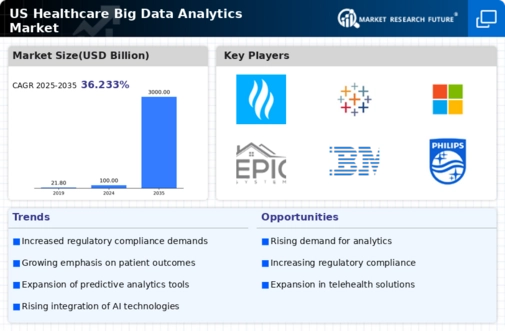US Healthcare Big Data Analytics Market Summary
The United States Healthcare Big Data Analytics market is poised for substantial growth, projected to reach 3000 USD Billion by 2035.
Key Market Trends & Highlights
US Healthcare Big Data Analytics Market Key Trends and Highlights
- The market valuation is expected to expand from 100 USD Billion in 2024 to 3000 USD Billion by 2035.
- A compound annual growth rate (CAGR) of 36.23% is anticipated from 2025 to 2035.
- The increasing demand for data-driven decision making in healthcare is likely to propel market growth.
- Growing adoption of advanced analytics technologies due to the need for improved patient outcomes is a major market driver.
Market Size & Forecast
| 2024 Market Size | 100 (USD Billion) |
| 2035 Market Size | 3000 (USD Billion) |
| CAGR (2025-2035) | 36.23% |
Major Players
Health Catalyst, Tableau, Microsoft, Epic Systems, SAS Institute, IBM, Philips, SAP, McKesson, Cerner, Optum, Oracle, Allscripts, Infor, EMC Corporation






















